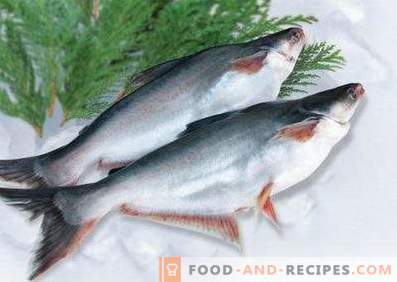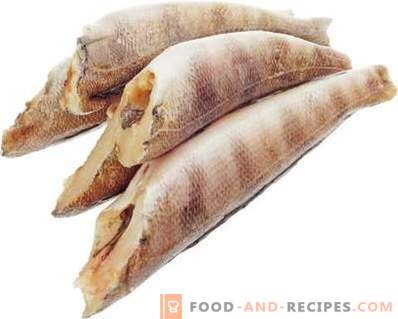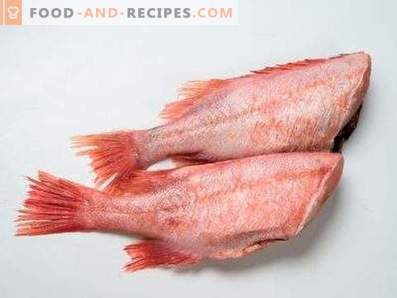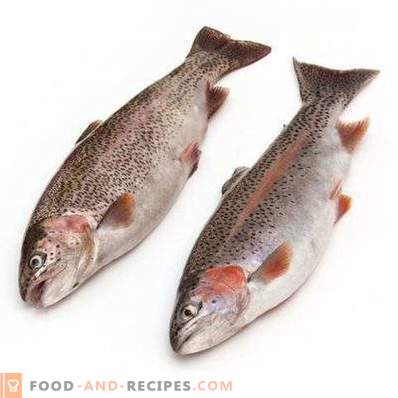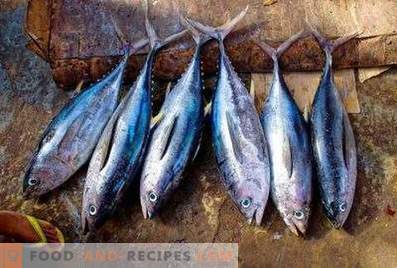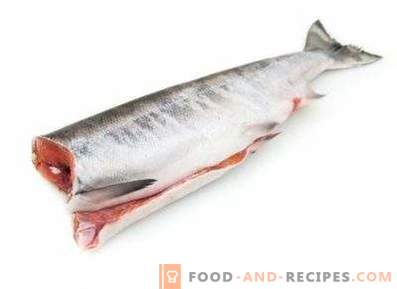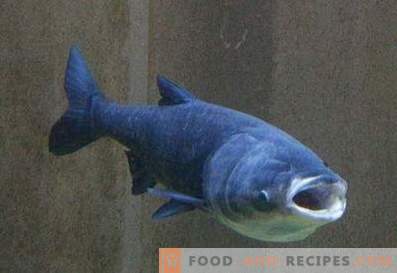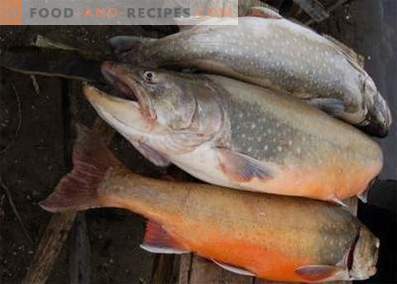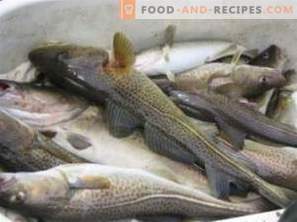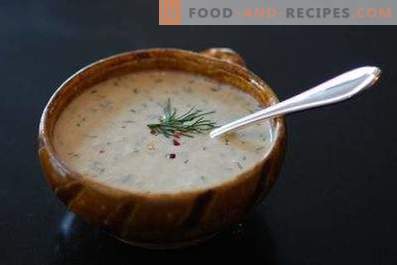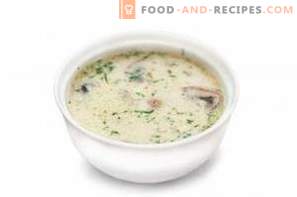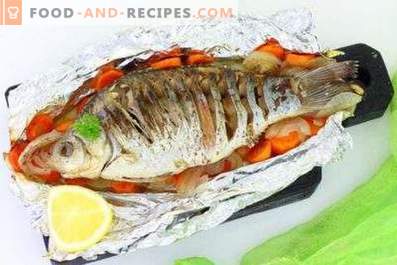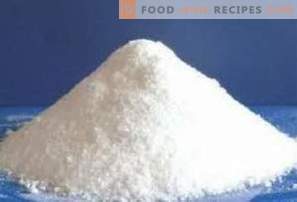
Catfish, or sea wolves, are ray-finned fish belonging to the perch-like order. Representatives of this family live in cold and moderately warm zones of the seas of the northern hemisphere. Many of them are valuable objects of commercial and sport fishing.
There are 5 types of catfish: striped, Far Eastern, spotted, blue and eel-like. Representatives of each of these taxonomic groups have their own morphophysiological and behavioral features. However, all sea wolves share the following external features:
- large elongated body weighing up to 32 kg and a length of up to 235 cm, tapering closer to the tail stem;
- dense thick skin covered with small cycloid scales;
- long dorsal and anal fins reaching the base of the tail;
- massive head with a rounded snout;
- powerful wide jaws;
- large, knobby teeth, which allow pushing through thick shell valves (it is thanks to them that the fish got its name).
Meat of sea wolves is a valuable food product. Its fat, tender, slightly sweetish flesh is almost completely devoid of small bones. Catfish meat is stewed, baked, smoked, salted, fried and boiled. In addition, it is used to make cutlets, baked puddings and fillings for fish pies.
Nutritional value
100 g of raw catfish contains:
- 19, 566 g of proteins;
- 5, 214 g of fat;
- 73, 155 g of water;
- 1, 093 g of ash;
- 79, 613 mg of cholesterol;
- 0, 488 g of omega-3 fatty acids;
- 0, 147 g of omega-6 fatty acids.
Vitamins in catfish
Catfish is rich in vitamins. 100 g of fish, not cooked, contains:
- retinol equivalent (A) - 59, 118 μg;
- thiamine (B1) - 0, 232 mg;
- Riboflavin (B2) - 0, 038 mg;
- pyridoxine (B6) - 0, 329 mg;
- ascorbic acid (C) - 1, 377 mg;
- tocopherol equivalent (E) - 0, 392 mg;
- Niacin equivalent (PP) - 5, 727 mg.
Useful elements
Macronutrients in 100 g catfish:
- potassium - 334, 447 mg;
- phosphorus - 179, 558 mg;
- sodium - 99, 873 mg;
- calcium - 29, 017 mg;
- chlorine - 164, 228 mg;
- sulfur - 189, 046 mg;
- magnesium - 34, 582 mg.
Trace elements in 100 g of fish:
- iron - 0, 492 mg;
- fluorine - 429, 874 mkg;
- copper - 69, 807 mkg;
- zinc - 0.577 mg;
- iodine - 49, 766 mcg;
- molybdenum - 3, 724 mcg;
- cobalt - 19, 027 mkg;
- chromium - 54, 309 mcg;
- nickel - 5, 633 mkg;
- manganese - 0, 028 mg;
- selenium - 83, 624 mkg.
Calorie calves
The energy value of 100 g of raw catfish is 95,884 kcal. In a similar portion of boiled fish - 104, 121 kcal, baked - 136, 916 kcal, fried - 219, 043 kcal, smoked - 158, 309 kcal, salted - 161, 717 kcal, stewed - 113, 288 kcal. Caloric content of 100 g of meatballs made from catfish - 203, 177 kcal.
Useful properties of catfish
- Catfish is rich in easily digestible protein. Therefore, dishes from this fish are useful for athletes, people engaged in heavy physical labor, and people recovering from serious injuries or prolonged illness.
- The substances contained in catfish meat have a positive effect on the functioning of the thyroid gland and the endocrine system as a whole.
- Seabass fillets are rich in antioxidants. Compounds belonging to this group neutralize the negative effects of free radicals, reduce the risk of developing cancer and slow down the processes that contribute to accelerated aging of the body.
- In the catfish meat there is a whole complex of substances that strengthen the local and general immunity.
- 100 g of this fish contains more than 13% of the daily norm of retinol for an adult. This vitamin helps to protect the visual apparatus from excessive loads, improves visual acuity, improves the condition of the skin and mucous membranes, reduces the risk of developing dermatological diseases.
- Vitamins of group B and other nutrients entering the human body with regular, but moderate consumption of catfish, accelerate the metabolism, promote weight loss.
- Seabass meat is useful for people suffering from heart disease and anemia. Substances with which this product is rich strengthen myocardium, normalize heart rhythm, maintain blood pressure within normal limits, improve blood circulation, positively affect the functioning of the hematopoietic system, and promote the elimination of “harmful” cholesterol from the body.
- Catfish contain calcium, phosphorus and other nutrients that strengthen bone tissue and reduce the risk of developing diseases of the musculoskeletal system.
- Nutritionists recommend that people suffering from diseases of the nervous system, at least 2 times a week include in the diet of seabass. Useful substances present in the composition of this product, reduce the risk of malfunctioning of the central nervous system, improve mood, relieve depression, increase overall body tone and performance.
- Potassium and other nutrients contained in catfish meat help to remove excess salts from the body, effectively and quickly eliminate edema.
- 100 g of fish contain about 52% of the daily norm of selenium for adult men and women. This trace element has a positive effect on the synthesis of sex hormones, increases female fertility, normalizes the work of the endocrine glands, helps the body to withstand infections and parasitic invasions.
- Fatty polyunsaturated acids, with which catfish meat is rich, increase the activity of the brain, strengthen the walls of blood vessels and give them additional elasticity, improve memory. In addition, they help people engaged in mental work, long concentrate on solving complex problems.
- Substances entering the body with regular consumption of snack foods and catfish dishes reduce blood clotting, preventing blood clots from forming. Therefore, this product is useful for persons suffering from varicose veins and thrombophlebitis.
- The seabass fillet contains a set of nutrients that help maintain the level of sugar in the blood within the normal range. Therefore, nutritionists recommend diabetics at least once a week to include this product in the diet.
- Catfish is rich in substances capable of providing water-salt and acid-base balance in the body.
Contraindications and harm to catfish
- Seabass meat is a potential allergen. Therefore, it is contraindicated for people who are allergic to fish and seafood.
- Abuse of fried catfish can cause obesity.
- Dishes from this fish are contraindicated for expectant mothers, women during lactation and children under 3 years old.
- Nutritionists recommend that people who have previously identified irregularities in the work of the pancreas, reduce consumption of catfish to a minimum.
